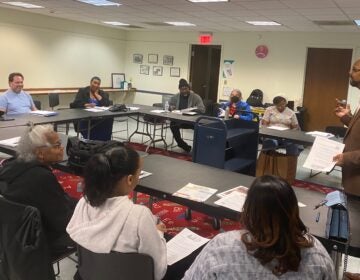Philadelphia working to reach more immigrants, poor about homestead tax exemption

As many as three in 10 homeowners who qualified for a recent property-tax break in Philadelphia did not register for it, according to city records released last week.
An analysis of government data by NewsWorks shows that the city’s poorest areas, as well as those with the largest percentage of Latino residents, tended to have the lowest signup rates for the “homestead exemption,” which can reduce an eligible owner’s property-tax bill by up to $400.
For instance, Philadelphia’s 19118 ZIP code is home to the affluent Chestnut Hill neighborhood. Only 5 percent of residents there live in poverty, according to Census data, and 3 percent are Latino. Eighty-six percent of homeowners in the ZIP code who were estimated to be eligible for the homestead exemption received it during the 2013-14 tax year, according to city data.
Compare that to the city’s 19133 ZIP code in North Philly, where more than half of residents are in poverty and most are Latino. City data show that only 42 percent of homeowners who were thought to be eligible for the property-tax break registered by this year’s deadline.
Kate Dreher of the city’s Office of Property Asssessment said the city’s estimates of eligible homeowners are “liberal” and based on Census data.
Several other ZIP codes in North, Southwest and West Philadelphia that struggle with high rates of poverty had signup rates below 60 percent. In parts of Northeast Philly, where fewer residents are poor, more than 80 percent of homeowners who were estimated to be eligible registered for the homestead exemption.
Language barrier
Prior to this year’s deadline, critics said the city government only translated advertisements for the tax break into Spanish and other non-English languages online. Councilwoman Maria Quiñones-Sánchez, the only Latina on City Council, said the city has improved since then by, for instance, translating fliers about the homestead exemption into Spanish.
Still, Quiñones-Sánchez said the city did not advertise the tax break enough in Spanish-language media.
“We’re not as immigrant-friendly as we claim,” she said. “We’re not taking advantage of technology and really making sure that we’re talking to people in their language.”
Quiñones-Sánchez said the city needs to collect better data to determine who is eligible for the homestead exemption, and that every department must get involved in outreach. She also supports a nearly $3 million proposal to provide free legal services to low-income residents with property-tax issues.
“In light of our increased poverty rate,” she said, “we need to say, ‘How do we become as proactive as possible to keep people in their homes?'”
Rob Dubow, the city’s finance director, said the city cannot afford to pay for the extra legal services at this time.
“We had a very tight budget this year and wound up being able to include very, very little of what Council members requested,” he said.
However, the city has set aside about $525,000 since last year to do outreach about its property-tax breaks, said Mayor Michael Nutter’s spokesman Mark McDonald.
Better outreach to poorer residents
Dreher of the city’s Office of Property Asssessment also said the city has tried to advertise for the homestead exemption in areas where poor residents might be, using SEPTA ads and notices in financial education centers.
She admits, however, that there is always room for improvement.
“We learned a lot of things about what we could have done better,” she said. “One of the things we found was that, unfortunately, sometimes messaging from the city falls on deaf ears, and we need to utilize existing community organizations and the media to get the message across.”
Applications for next year’s homestead exemption are due Sept. 13. To qualify, a homeowner’s primary residence must be located in Philadelphia. The city’s homestead hotline — where homeowners can apply for the tax break in any language — is 215-686-9200.
WHYY is your source for fact-based, in-depth journalism and information. As a nonprofit organization, we rely on financial support from readers like you. Please give today.




